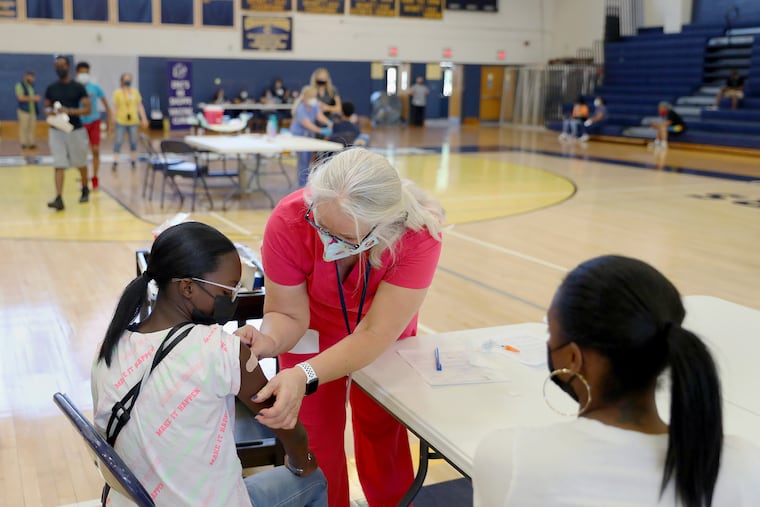Pediatrician: Here’s how I’m thinking about vaccines for my kids | Expert Opinion
Listen to experts as opposed to uninformed sources and social media.

I’m a pediatrician, and I took my two children to get the COVID-19 vaccine on the day that they became eligible to receive it.
As a physician, I understand the science and testing behind the vaccines, and with each passing day it becomes more apparent to me that their health benefits far outweigh any concerns.
In the early months of the pandemic, we were encouraged by the notion that children were, for the most part, a low-risk population and largely unaffected by the virus. But, as the virus has continued to spread, it has also mutated, and the current delta variant is more transmissible, increasing the number of children who are sick. The proof is in the numbers: During the week of Aug. 5 through Aug. 12, more than 120,000 pediatric cases of COVID-19 were recorded.
» READ MORE: Philly doctor: I’m now as fearful of the delta variant as I was of COVID-19 in March 2020 | Expert Opinion
Unfortunately, the vaccine is currently not available to those under the age of 12, which puts younger kids at a greater risk of contracting the virus. Exacerbating this situation for children is the high number of eligible, but non-vaccinated people, who are more likely to contract COVID-19 and spread the virus. Those who haven’t received the vaccine are more likely to experience severe illness and hospitalizations as well. Recent data from the CDC have shown that 97% of COVID-19 hospitalizations in the United States are among the unvaccinated population.
We also know that COVID-19 can cause children to become seriously ill and require hospitalization. According to the American Academy of Pediatrics (AAP), more than 16,000 children nationwide have been hospitalized because of COVID-19 since the start of the pandemic. In some cases, these children develop Multisystem Inflammatory Syndrome (MIS-C). This condition can cause different parts of the body, such as the heart, brain, lungs, skin, eyes, or gastrointestinal organs, to become inflamed. While most children do recover, MIS-C is a serious condition and can be fatal.
My husband and I have both received the COVID-19 vaccine, and we followed the science closely as we considered what to do about our daughter, 14, and son, 12. As parents, we too had a higher level of scrutiny when it came to vaccinating our children. That’s why we turned to experts as opposed to uninformed sources and social media.
In addition to information shared by the AAP, we went to the CDC, which provided valuable information on the efficacy surrounding vaccinations for children, the world-renowned Mayo Clinic, which offered an excellent, easy-to-understand question and answer on its site, and Pfizer, which made available a site dedicated to explaining its studies on vaccinating children — studies involving close to 3,000 adolescents.
It has been devastating to watch the recent dramatic rise in cases of COVID-19 due to the delta variant, particularly because I know that many of these cases could have been prevented by the vaccine. Therefore, I remain committed to educating the public on the safety and efficacy of the vaccines.
Regarding the COVID-19 infection, we still have a lot to learn, including the long-term side effects of the virus in adults and children. Reports suggest that long-term effects after infection in children can include extreme exhaustion, muscle and joint pain, heart palpitations, trouble concentrating, decreased performance in both schoolwork and sports, breathing problems, headaches, and insomnia.
» READ MORE: As an emergency doctor fighting delta’s rise, I’ve seen trust change on the COVID-19 vaccine | Expert Opinion
For all these reasons, I believe vaccination is the right choice for all who are eligible. I encourage other parents to share their questions and concerns with pediatricians to understand the best options for their children. And I urge all parents to talk with their children about the vaccine and the data being reported from vaccine clinical trials. Listen and share the science with them, so together, as a family, you can make the smart decision to get vaccinated against COVID-19.
As parents, it is incumbent on us to not miss this opportunity to keep our children safe.
Olubunmi Ojikutu, MD, is chair of the Department of Pediatrics at Reading Hospital.